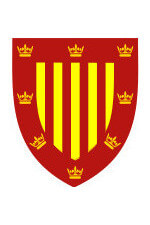Peterhouse
The volumes great, who so doth still peruse,
And dailie turnes, and gazeth on the same,
If that the fruicte thereof, he do not use,
He reapes but toile, and never gaineth fame:
Firste reade, then marke, then practise that is good,
For without use, we drinke but LETHE flood. Geffrey Whitney, A Choice of Emblemes (Leiden, 1586), p. 171, dedicated to Andrew Perne.

Peterhouse (founded 1284) is the oldest of the Cambridge Colleges. Its founder, Hugh of Balsham, Bishop of Ely, bequeathed a number of books to the College on his death in 1286. The continuing generosity of members of Peterhouse built up a substantial library during the next two and a half centuries. A catalogue begun in 1418 and maintained until 1481 gives details of over 450 manuscripts, more than two hundred of which survive today, overwhelming still in the College's possession. In addition, manuscripts were added by donors from the end of the fifteenth century until the mid-seventeenth century. A total of 276 medieval manuscripts belonging to Peterhouse are now on deposit in the University Library, where they may be consulted.
As part of the process of recataloguing and preserving the College's collections, it has been decided to present highlights from the Peterhouse manuscripts in digital form. The first group of manuscripts to be digitised was the independent collection of sixteenth- and seventeenth-century part books of choral music, which are available through the Digital Image Archive of Medieval Music (DIAMM) . It is now hoped to present some of the College's medieval manuscripts with appropriate commentary as part of the Cambridge Digital Collections. The first of the College's medieval manuscripts to be digitised (the Equatorie of the Planetis, Ms. 75.1) has now been presented with appropriate commentary as part of the Cambridge Digital Collections. As funding becomes available, further manuscripts will be added to the online collection. A first step has also been made with the presentation of manuscripts from the College’ s post-medieval holdings, with the digitisation of a recently acquired archive describing the development of the jet engine by Sir Frank Whittle and Power Jet in the years 1940-41.

